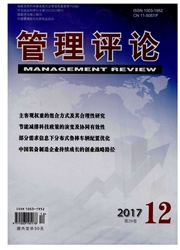

 中文摘要:
中文摘要:
本文收集了我国1978-2013年间的节能减排政策,从政策力度、政策措施和政策目标三个维度开发了节能减排政策量化标准并据此对收集的政策进行了量化.构建了政策效力和政策协同度的度量模型.利用量化数据对我国节能减排政策的协同演变进行了分析。研究表明:改革开放以来,我国政府颁布的节能减排政策数量越来越多,政策总效力越来越大,政府对节能减排的重视程度也越来越大;在节能减排政策的演变过程中,政策总效力的增加主要是由政策数量的增多引起的。政策的平均力度不但没有增加反而逐渐降低,并且政策的制定表现出一定的战略和系统缺乏性;随着政府对节能减排的日益重视。我国节能减排政策的部门协同、措施协同和目标协同的协同状况逐渐增强。并呈现出阶段性的增长特征,节能减排政策的制定也逐渐由单一部门为主向相关部门联合为主转变;随着政策措施协同的逐渐增强。我国政府逐渐增大金融措施、人事措施、财政税收措施和其他经济措施与行政措施及引导措施的协同。并且箕他措施与行政措施的协同是节能减排政策措施协同中的核心,节能减排政策的制定也逐渐由依靠单一措施向综合利用各种政策措施转变;在节能减排政策目标协同的演变过程中,政策目标间的协同程度逐渐增强。不同政策目标在实现过程中的协同状况也逐渐得到改善,但改善的程度有待进一步优化;在部门执同中.协同颁布的政策力度低、实施期限短.且处于核心地位的部门不是环境保护部门,而是其他掌握经济和行政资源的部门。最后。论文从政策战略、政策力度、政策措施和政策目标等角度为我国节能减排政策的制定提出了相关政策建议。
 英文摘要:
英文摘要:
This paper collects the energy conservation and emission reduction policies in China from 1978 to 2013, develops the quantitative criteria of energy conservation and emission reduction policy from the three dimensions of policy power, policy measures and policy objectives, and accordingly quantizes the collected policies, establishes the metric model of policy effectiveness and policy coordination degree, and analyzes the evolution and coordination of those policies by using quantized data. The research shows that since the reform and opening up, Chinese government has formulated an increasing number of energy conservation and emission reduction policies, and the overall effectiveness of them has also become increasingly significant, and the government puts more and more emphasis on energy conservation and emission reduction; in the evolution process of energy conservation and emission reduction policies, the increase of policy overall effectiveness is mainly caused by the increasing policy quantities, and the average power of policies does not increase but gradually decreases, and the policy-making shows a certain lack of strategy and system; with the growing importance attached by the government to energy conservation and emission reduction, the coordination status of department coordination, measures coordination, and objectives coordination of energy conservation and emission reduction policies is gradually strengthened and presents the periodical increase characteristics, and the formulating of energy conservation and emission reduction policies is shifting from single department oriented to related departments coordination oriented step by step; as the coordination of policy measures is strengthened by degrees, the Chinese government gradually improves the coordination among the financial, personnel, fiscal, tax and other economic measures and administrative as well as guiding measures, and the coordination between administrative measures and other measures is the core of the coordinated measures of energy
 同期刊论文项目
同期刊论文项目
 同项目期刊论文
同项目期刊论文
 期刊信息
期刊信息
